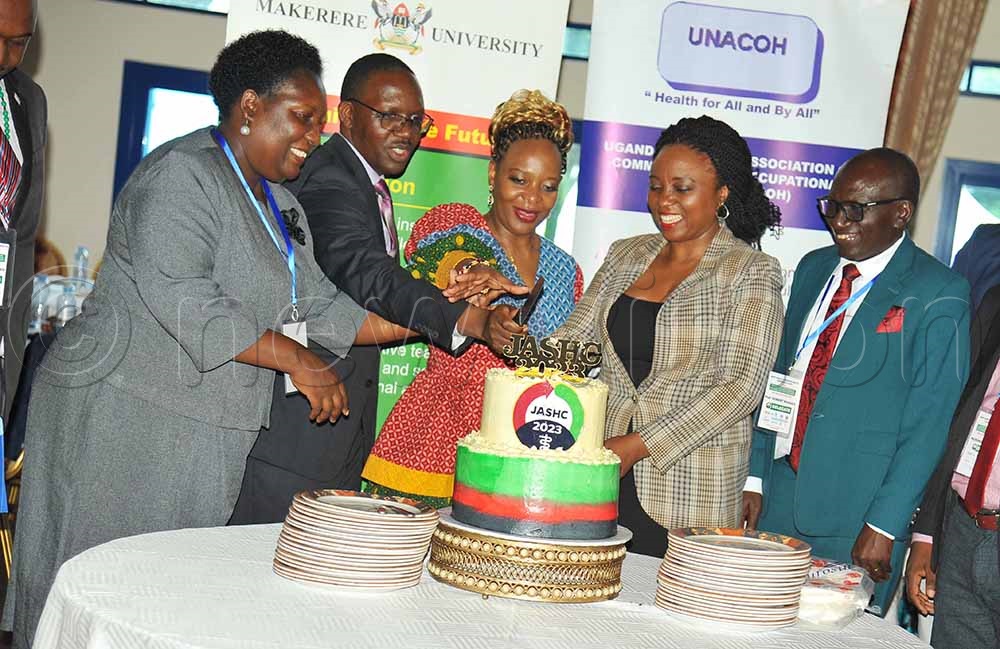Invest heavily in medics to de-colonise health sector - Experts
According to Prof. Flavia Senkubuge, the deputy dean of stakeholders at the Faculty of Health Sciences at the University of Pretoria South Africa most of the African countries inherited health systems from the colonial spaces.
Flavia Senkubuge Deputy Dean Stakeholder’s Faculty of Health Science University of Pretoria handing over a cake to the organising committee during the closing ceremony. (Credit: Godiver Asege)

NewVision Reporter
@NewVision
_______________
African health experts have called on governments to invest heavily in health professionals in order to de-colonise the sector.
According to Prof. Flavia Senkubuge, the deputy dean of stakeholders at the Faculty of Health Sciences at the University of Pretoria South Africa most of the African countries inherited health systems from the colonial spaces.
“If I look at my own country South Africa, we inherited a health system that was really inequitable and in a sense, although we are doing excellent work in some sectors, we are grappling with the injustices of the past,” Senkubuge said.
This, she said, is the reason most of the African health systems have a high bio-medical model in terms of the health systems that need to revitalize the primary health care because it is the first point, that populations seek health care.
“As part of the de-colonisation project, we need to deliver health care to where people are, such that they don’t have to travel long distances to access health care,” Senkubuge said.
She proposed looking for an architecture focusing on thinking whether the health system is fit for purpose and rationalise whether we are getting the health outcomes that we need.
She underscored the need to re-invest in the African Talents in order to enhance the improvements in the health sector.
“At my University, I work with the most amazing African young minds of health professionals, but if we don’t invest in them heavily, because they are vibrant, talented and exceptional young minds, we are going to lose them to the globe. Investment should not only be in education, but we must say if we have trained somebody who is an ear, nose and throat (ENT) surgeon, we also have to create the infrastructure to support that person to carry out the most cutting-edge surgeries in ENT and psychiatry, among others,” she explained.
Senkubuge re-echoed that investment is very important in grooming our own teams particularly in clinical expertise but also in research and development.
(L-R) Annet Kutesa, the Dean School of Dentistry Makerere University, Daniel Kyabayinze, the Director Public Health, Flavia Senkubuge Deputy Dean Stakeholder’s faculty of Health Science University of Pretoria, Damalie Nakanjako Principle College of Health Science with Robert Basaza of Uganda National Association of Community Occupational Health (UNACOH) cut cake after the 17th Joint annual Scientific and Health Conference held in Entebbe Uganda on 22nd September 2023. (All Photos by Godiver Asege)
“Looking at most of the data collected by young people, it shows the vivid experience that top minds of HIV/Aids, malaria, and communicable diseases are here in Africa, we can’t afford to lose them. That’s why, I am a strong believer in investing heavily in the health personnel,” she emphasised.
Sekubuge was giving a keynote address during the 21st Dr. Mathew Lukwiya Memorial Lecture held at the closure of the Joint Annual Scientific and Health (JASH) and Uganda National Association of Community and Occupational Health (UNACOH) conference in Entebbe last week.
The conference, organised by the Makerere University College of Health Science, was driven under the theme: “Advancing Health; Opportunities and Innovations in the Face of Emerging and Re-emerging Global Health Challenges”.
Senkubuge underscored the need to create a new African architecture, particularly for a pandemic response saying this can be built on three pillars of UBUTU (meaning I am because we are), HARAMBE meaning (we collectively work together and leverage excellence), and Alkerbulan, meaning the mother of mankind (de-colonising the health system and making it fitter for purpose).
“I believe that if we can adopt these three pillars as our own, we can be able to deal with not only emerging pandemics but also the global health challenges and those ones that affect us in Africa,” she said.
The Minister of State for Health and General Duties, Anifa Kawooya, in a speech read by Dr Daniel Kyabayinze applauded the College of Health Sciences for training the cadres serving in the health care system to achieve the desired outcomes.
The conference resonates with sharing extensive knowledge and experience on opportunities and innovations in the face of emerging and re-emerging global Health challenges.
“I appeal to all of us to use the knowledge shared from this conference to improve the quality of health care services in the country at all levels of health care provision in fulfillment of our human capital development contributions,” she said.
Kawooya said her ministry has strategised well in strengthening the incident management systems, infection prevention, and control practices, surveillance, rapid response, laboratory capacities, and community mobilization among other critical areas.
Comments
No Comment